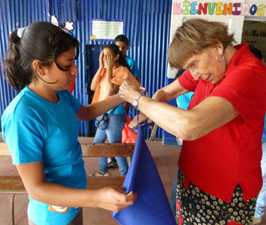Nun in El Salvador Fights AIDS One Village at a Time
New American Media

Dawn glares red over San Salvador as Sr. Mary Virginia Annel’s team packs an aging maroon station wagon for a day’s journey to a remote village. The trip is one facet of the work they do every day, struggle against the proliferation of HIV/AIDS in this tiny Central American country, still rebounding from a 12-year civil war that took 75,000 lives, most at the hands of a U.S.-supported army.
Annel, 74, who entered the Roman Catholic Maryknoll religious order at age 18 and became a medical doctor, arrived in El Salvador in 1993, just after the war ended. By then she had “methodically, coolly looked at where the health challenges for the future were globally,” as a public health professional. “I’m a thinker, not a feeler,” she insists. “I recommended we go to countries next door to AIDS epicenters to work on prevention, and keep the disease from spreading.”
Born in Chicago, willowy tall with short dark blonde hair, Annel wears a red polo shirt with the Spanish name of the education and accompaniment group she founded, CONTRASIDA, and its logo: a white candle with an ever-burning flame embraced by a red HIV/AIDS awareness ribbon. In the early 1990s the epidemic’s Central American epicenter was neighboring Honduras. Thousands of Salvadorans had fled to Honduran refugee camps during the civil war to escape army massacres; Annel reckoned returning refugees at least would have heard of AIDS, a starting point for education.
Beginning as an Archdiocesan team, now a non-profit foundation (proper name: Fundación Salvadoreña para la lucha contra el sida“Maria Lorena”), Annel’s team opened an urban clinic and soon was reaching 40,000 people a year with classes, literature and workshops for teachers and others who might “multiply” correct information. AIDS was stigmatized, even considered punishment for wanton sexual behavior. Families fed affected members with disposable plates; a Catholic school run by nuns expelled children of stricken parents. Agencies including prisons came to CONTRASIDA with requests for education. Annel found openness in the Church, where the late Archbishop Arturo Rivera y Damas formally presented the team to clergy.
“Today the epidemic has become focalized,” she said, and a chronic disease. It remains heterosexual, but its highest prevalence is among transgender people; men who have sex with men; and commercial sex workers, including young girls trafficked in border areas that serve as stepping stones to the United States. At least 25,000 people live with HIV/AIDS out of the population of some 6 million, although the United Nations agency UNAIDS estimates some 40-50 per cent of cases are unreported. Fifty support groups followed CONTRASIDA; the government provides medication free. From having the region’s second-highest rate of the disease, after Honduras, El Salvador has dropped to fifth place.
Nevertheless, women are increasingly infected, partly a result of a machismo culture that assumes having multiple sex partners is a proof of masculinity. And the condition is still regarded fatal, even though it is controlled with medication taken correctly. A high birth rate makes the population lopsidedly young — 30 per cent under age 15– and sexual relations begin early. That is why Annel is expanding outreach to adolescents.
“In the United States condoms are the be all and end all” in HIV prevention, she said during the long drive, past fields of ripening rice. “Here we tell people they are more than their thinking, they are their hearts, too, and try to get them to take themselves to the future.” At the same time, CONTRASIDA covers sex education and customary preventions — abstinence, faithfulness to one partner, condom use. At intensive weekend retreats, with names like “Masculinities and Prevention of HIV,” men engage in participatory learning in the model of Paulo Freire, games and reflection, even sessions on cooking and aromatherapy “to awaken the senses and feminine energy.” The aim: to become conscious of the implications — and risks — of the traditional macho way of being a man, including discussions of violence against women, sexual diversity, and active, sensitive fatherhood. Women’s workshops emphasize self-esteem and self-assertion. Upcoming sessions are scheduled for Supreme Court staff, seminarians, and police in line for promotion to officers.
Annel drops off two CONTRASIDA “communicators” at a radio station to broadcast an interview about an upcoming Mass on World AIDS Day to raise awareness, show solidarity with people living with HIV, and commemorate those who have died. F
inally the station wagon climbs a road of slippery clay, past sustenance plots of corn and beans, houses made of sticks and mud bricks. In a schoolyard, a crowd of young teenagers waits anxiously. They wear bright t-shirts bearing the name of one of several CONTRASIDA theater groups organized to bring HIV/AIDS awareness to adolescents, encouraging them to understand and accompany the afflicted in their parishes.
“We learn a lot, about HIV, and about how we don’t have to accept violence against us,” said Miriam Pleiter, 14.
“And we learn how to act,” said Pleiter’s friend, Evelin Vasquez, also 14. “I love it.”
The bedsides of the ill seem far away, but for Annel the youngsters in the schoolyard are part of the struggle. Over hours the wind picks up and blows below the village across the plain that spreads to the Pacific, slate blue in the distance. Annel once became ill every time she lost a patient, feeling she had failed as a doctor. Someone told her, “I give thanks for the gift that person has been in my life.”
“I see we are really in God’s hands,” says Annel. “We are all dying. What I’ve done is appreciate more now the loving heart of people.” Six people a day are infected in El Salvador. Youngsters practice for the AIDS Mass with voices of hope.
“Something new is being born, in my people it is beating like a heart,” they sing. “Growing with us, something new is being born, growing among the poor.”





